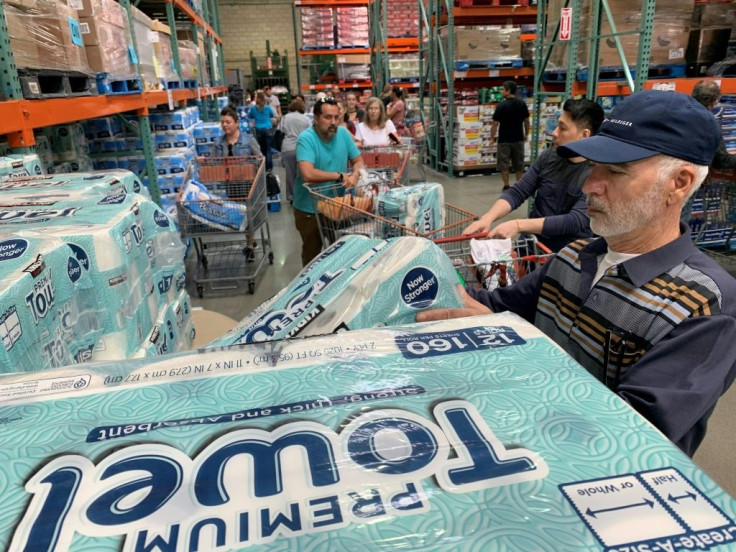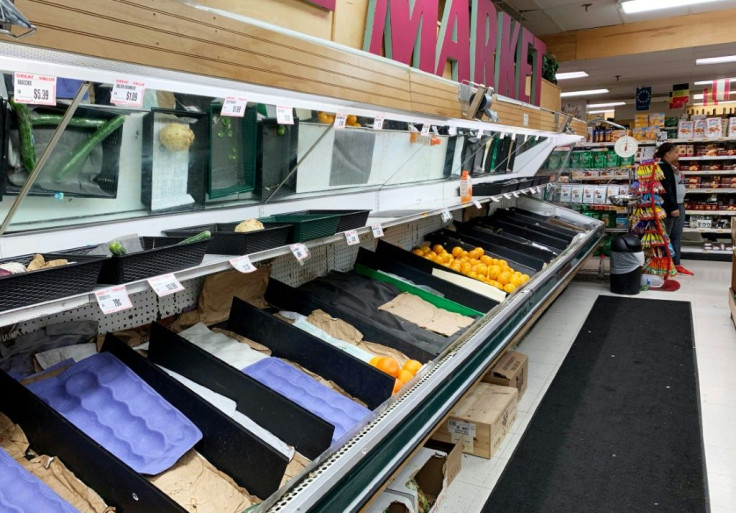Coronavirus USA: Trump Asks Americans To 'Relax' Amid COVID-19 Outbreak

KEY POINTS
- Panic buying by Americans is accelerating as COVID-19 spreads irresistably across the U.S.
- Trump says "you don't have to buy so much ... relax"
- He also says there are no shortages ... "other than people buying anywhere from three to five times what they will normally buy"
President Donald Trump urged Americans on Sunday not to hoard food during a White House press conference just minutes before the federal coronavirus task force began its briefing on the status of the fight against COVID-19.
Americans have taken to panic buying nationwide, stripping shelves of health essentials such as rubbing alcohol and hand sanitizers in anticipation of lockdowns implemented by hard-hit COVID-19 countries such as China and Italy.
"You don't have to buy so much," said Trump about hoarders. "Take it easy. People are going in and buying more."
He said Walmart CEO Doug McMillan commented customers are buying more than they buy at Christmas. Trump also said U.S. retailers will meet the needs of the Americans public.
"Relax. We're doing great. It all will pass. The folks we spoke to, they've done a fantastic job," said Trump.
"But again, they asked me to say, can you buy a little less, please. I thought I would never hear that from a retailer. All of them are working hand-in-hand with the federal government as well as state and local leaders to ensure food and essentials are constantly available, and they will do it."
Trump said there are no shortages ... "other than people buying anywhere from three to five times what they will normally buy."
The panic buying and hoarding is also cause for concern among retailers. A leading food industry trade group sees its members instituting more limits on food purchases in the coming weeks as panic buying rages across the United States due to the widening coronavirus pandemic.
The Food Marketing Institute (FMI) is encouraging its members to limit purchases of food items to make sure all customers get what they need. FMI's membership consists of 40,000 retail food stores and 25,000 pharmacies. Based in Virginia, FMI is a trade group for food marketing, food retailers, and wholesalers.
“Grocery stores become the center of the community,” said Doug Baker, FMI vice president of industry relations. “It’s the lifeline during a time of disaster. They are on the front lines.”
Baker said he expects more limits on food purchases in the weeks ahead as COVID-19 expands across the U.S. He said purchase limits help prevent hoarding. In turn, hoarding can lead to price-gouging by third-party vendors or shortages that can hurt sick or vulnerable people.

Baker also said purchase limits create “some calmness and a game plan” as grocers cope with heavily-trafficked stores.
“In order for us to get through this, it can’t be me against you,” he said. “We’re really going to have to come together as a society.”
Major U.S. grocery chains led by Kroger's, H-E-B and Walmart are seeing Americans flood their stores to empty shelves of rubbing alcohol, hand sanitizers, toilet paper and other essentials for hunkering down as COVID-19 spreads nationwide in 49 out of 50 states.
Texas-based H-E-B is limiting food purchases per customer while others like The Kroger Company, the fifth-largest retailer in the world, are hiring more people to cope with the customer flood. On the other hand, the customer tsunami is exhausting Walmart, Inc. employees enough to force the largest U.S. grocery retailer to reduce hours at its U.S. stores. Apart from resting harried employees, the shorter shopping hours (from 6:00 a.m. to 11:00 p.m. until further notice) will allow more time to replenish shelves and clean and sanitize stores against the COVID-19 coronavirus.
© Copyright IBTimes 2025. All rights reserved.





















